Average Price for a Dental Implant: Costs Breakdown and Factors
When considering tooth replacement options, many people wonder about the average price for a dental implant. Dental implants are a highly effective and long-lasting solution for missing teeth, but the costs can vary widely based on several factors. Understanding the typical price range and what affects these costs is essential for making an informed decision about your dental health.
How much is the average price for a dental implant?
The typical cost for a dental implant is between $2,500 and $7,000. Additionally, fees may be higher depending on the complexity of the case and any additional procedures required. The cost of the implant includes the surgical placement of the implant fixture, abutment, and crown (may have cost of srcew).
Here’s a breakdown of the possible costs:
- Implant post: $1,000 – $3,000
- Abutment and crown: $1,000 – $3,000
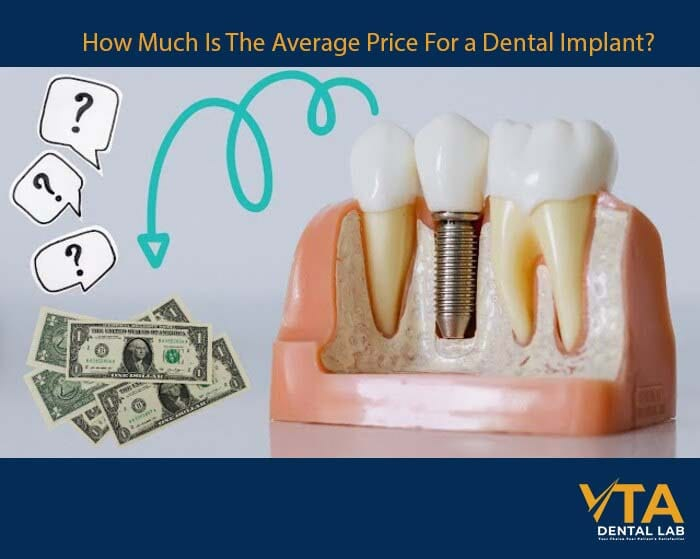
The average price for a dental implant
A popular dental implant option that many patients prefer today is abutments for dental implants and crowns made from zirconia material, which offers a natural look and high durability. Accordingly, prices from selected dentists across the United States show that zirconia implants will cost several hundred dollars more than titanium.
The Cost of a Single Tooth Implant
The average price for a dental implant across the United States based on the American Dental Association’s Health Policy Institute cost survey, the total cost of an implant body, abutment, crown, and other necessary procedures ranges from $3,100 to $5,800.
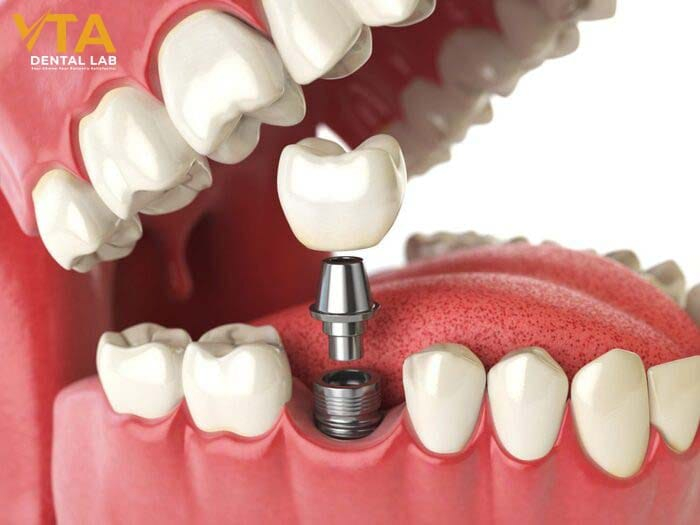
The cost of a dental implant depends on the location of the surgery
The Cost of a Multiple Tooth Implant
If you are replacing more than one tooth next to each other, you have more implant options that can help you save some money.
For example, if you are filling a gap of three or four adjusted teeth, you may be used to an implant-supported bridge, which lowers the total cost: ranging from $6,000 to $10,000. Because two implants can support three or four neighbor teeth instead of needing a single implant for each tooth.
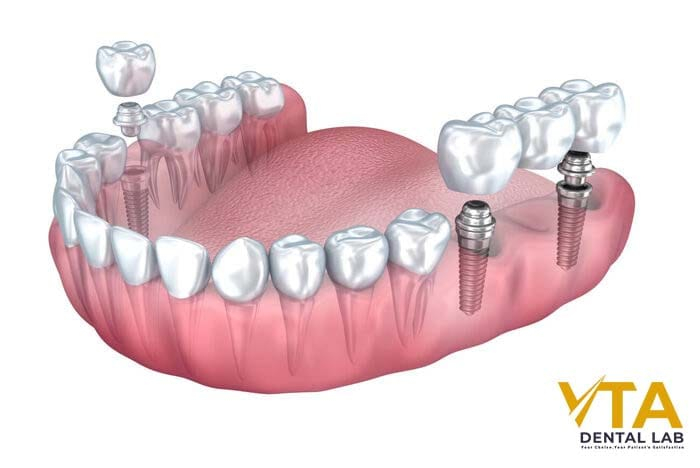
The Cost of a Multiple Tooth Implant
The Cost of a Full Mouth Implant
If you are missing all the teeth in one or both arches, it can be very expensive to replace each tooth with a single implant. This option can cost you between $60,000 and $90,000.
On the other hand, when choosing an implant-supported denture solution, it means two complete dentures replace all the teeth in the upper and lower jaws. The dental arches in each jaw are anchored by 4, 6, or 8 implants in each jaw, this option is also known as All-on-x, typically ranging from $24,000 to $50,000 for a complete set.
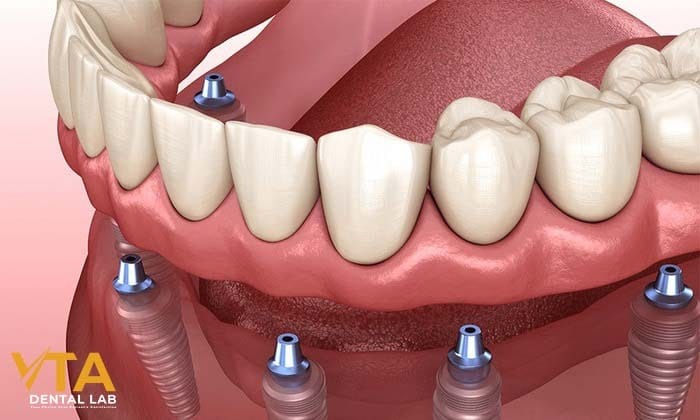
Dental implants can cost thousands of dollars
Additional costs associated with dental implants
In addition to the primary costs of the dental implant procedure, patients may need to consider several additional costs associated with dental implants. These extra expenses often arise from pre-surgery preparation, post-surgery care, and long-term maintenance:
Initial Consultation and Diagnostic Fees: The initial examination with the dentist or oral surgeon may have a fee, often ranging from $50 to $300.
Pre-Surgical Procedures: If there isn’t enough jawbone to support an implant, a bone graft may be necessary. This can add $300 to $3,000 depending on the material used.
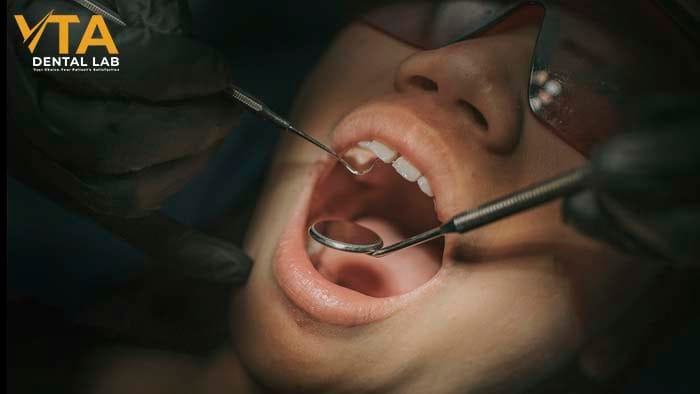
Bone grafts can increase the cost of dental implants
Sinus Lift: A sinus lift may be required for implants in the upper jaw if the sinuses are too close to the implant site. This procedure typically costs between $1,500 to $3,000.
Tooth Extractions: Simple extractions range from $75 to $300 per tooth, while more complex surgical extractions can cost up to $500 or more per tooth.
Gum Disease Treatment: If a patient has gum disease, it needs to be treated before implants can be placed. Scaling and root planning can cost $200 to $300 per quadrant.
What are the factors affecting dental implant costs?
Several factors can affect the cost of dental implants, influencing the overall expense of the procedure. Here are the key factors:
Geographic location
Price varies depending on the country or city where the procedure is performed, urban areas with higher living costs typically charge more. Additionally, well-known or highly specialized practices may charge a higher price for their service.
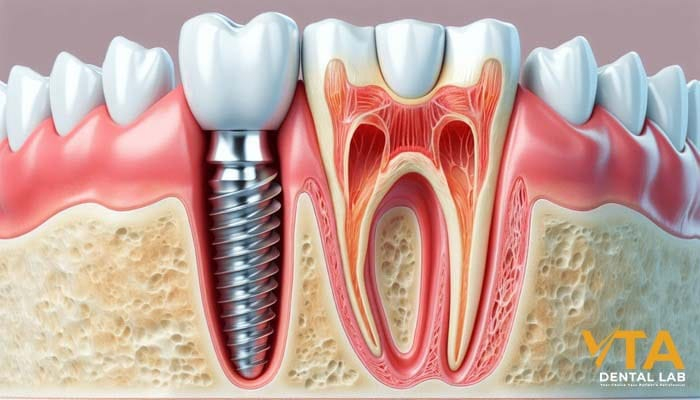
The city or state you live in may affect how much you pay for dental implants
Number of Implants Needed
The number of implants needed (single, multiple, or full-arch) directly impacts the total cost. The cost per implant decreases if multiple implants are required, but overall expense increases as more implants are placed.
Furthermore, procedures like “all-on-x” (full-arch implants) are more complex and expensive than single-tooth implants due to the number of implants involved and the restorative work needed to complete a full set of teeth.
Type and Quality of the Implant
The most common implant material is titanium, which is durable and highly compatible. Besides, fixture implants are not one size, they are customized to fit the patient’s specific needs, which also can affect the price.
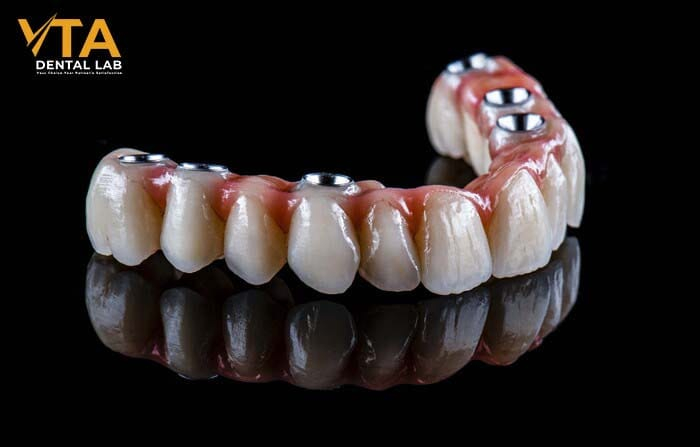
Titanium is the most cost-effective material for implants
Pre-Operative and Additional Procedures
If there is insufficient bone in the jaw, the graft may be necessary; and the situation for the upper jaw implant, a sinus lift may be required if the sinus cavity is too close to the implant site, increasing the cost.
Does insurance cover dental implants?
If you have dental insurance, it may cover part of the implant costs or help reduce the total expense by covering certain stages of the procedure. Your insurer is more likely to provide coverage if the implant is necessary to preserve or restore the health of your teeth and gums.
However, if the implant is solely for cosmetic purposes, it typically won’t be covered.
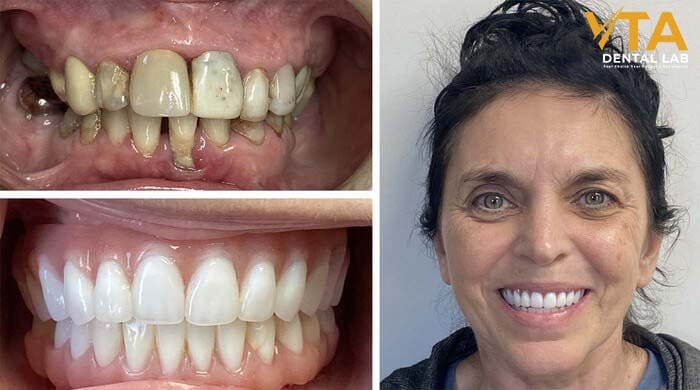
Dental insurance may cover part of the implant costs
Summary
The average price for a dental implant can vary depending on factors such as location, the dentist’s expertise, and additional procedures like bone grafting or sinus lifts. While the initial cost may seem high, the long-term benefits of durability, functionality, and improved oral health make dental implants a valuable investment.
By understanding the costs involved, you can make an informed decision and work with your dentist to find the best solution for your needs and budget.
In conclusion, understanding the average price for a dental implant is crucial for anyone considering this dental solution. While costs can vary based on factors, such as location and implant type, investing in dental implants offers significant long-term benefits for oral health and aesthetics. For personalized advice and accurate pricing, consult a reputable dental professional.